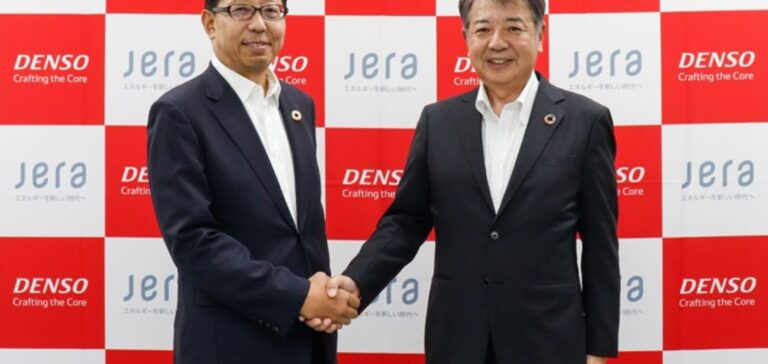JERA, Japan’s largest electricity producer, and automotive components manufacturer Denso Corp. are collaborating to develop a hydrogen production technology using solid oxide electrolysis (SOEC) cells and waste heat energy. This initiative aims to reduce energy consumption and contribute to global decarbonization.
Collaboration objectives
The two companies plan to launch a joint demonstration of this technology at a JERA thermal power plant as early as fiscal year 2025.
The results of the 200 kW demonstration test will form the basis for expansion to a scale of several thousand kW by integrating several SOECs.
The aim of this collaboration is to rapidly establish a global supply chain for green hydrogen and ammonia. Denso will apply its technology, perfected in automotive systems, to the SOEC, which stands out for its high stability and efficiency. JERA, for its part, is committed to building a hydrogen and ammonia supply chain aiming for carbon neutrality by 2050, as part of its “JERA Zero CO2 Emissions 2050” program.
Challenges for JERA and Denso
JERA recently completed a 20% ammonia co-firing test at its 1 GW coal-fired unit at the Hekinan thermal power plant.
This marks the world’s first ammonia co-firing at a large commercial coal-fired power plant.
SOECs operate at high temperatures, using a ceramic membrane as electrolyte to electrolyze water and produce renewable hydrogen.
This technology requires less electrical energy for electrolysis than conventional methods such as alkaline electrolysis and proton exchange membrane.
According to Commodity Insights, hydrogen produced in Japan by alkaline electrolysis cost $6.23/kg on August 2, up 33% on the previous month.
Cost analysis and outlook
In New South Wales, the cost of hydrogen produced by the same process reached $9.58/kg, up 46.26% over one month.
These increases underline the importance of developing more efficient, energy-saving technologies such as SOEC.
The partnership between JERA and Denso is strategic for achieving Japan’s decarbonization goals and positioning these companies as world leaders in green hydrogen production.
The results expected from this collaboration could offer viable and sustainable solutions to the world’s energy challenges.
JERA and Denso’s initiative to develop SOEC technology represents a significant step towards a cleaner energy future.
This collaboration has the potential to transform hydrogen production and set new standards in the global energy industry.






















